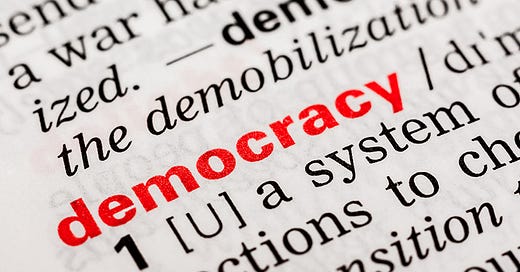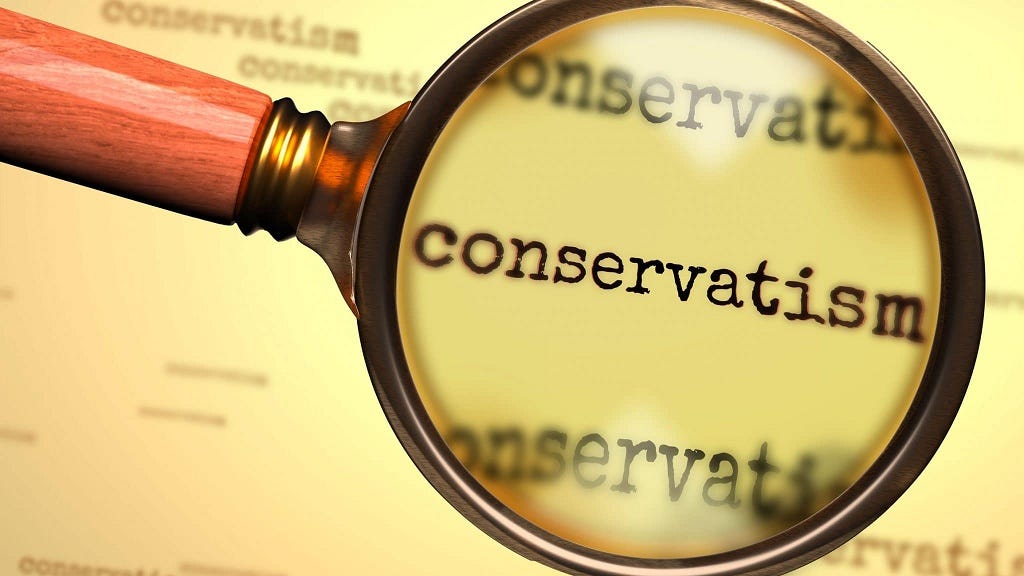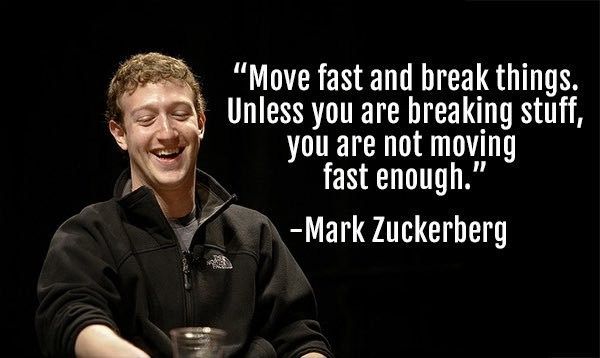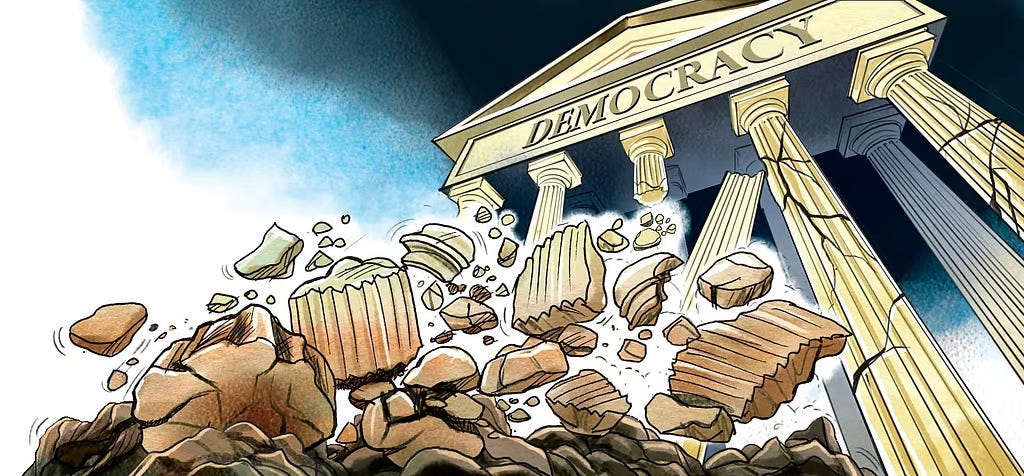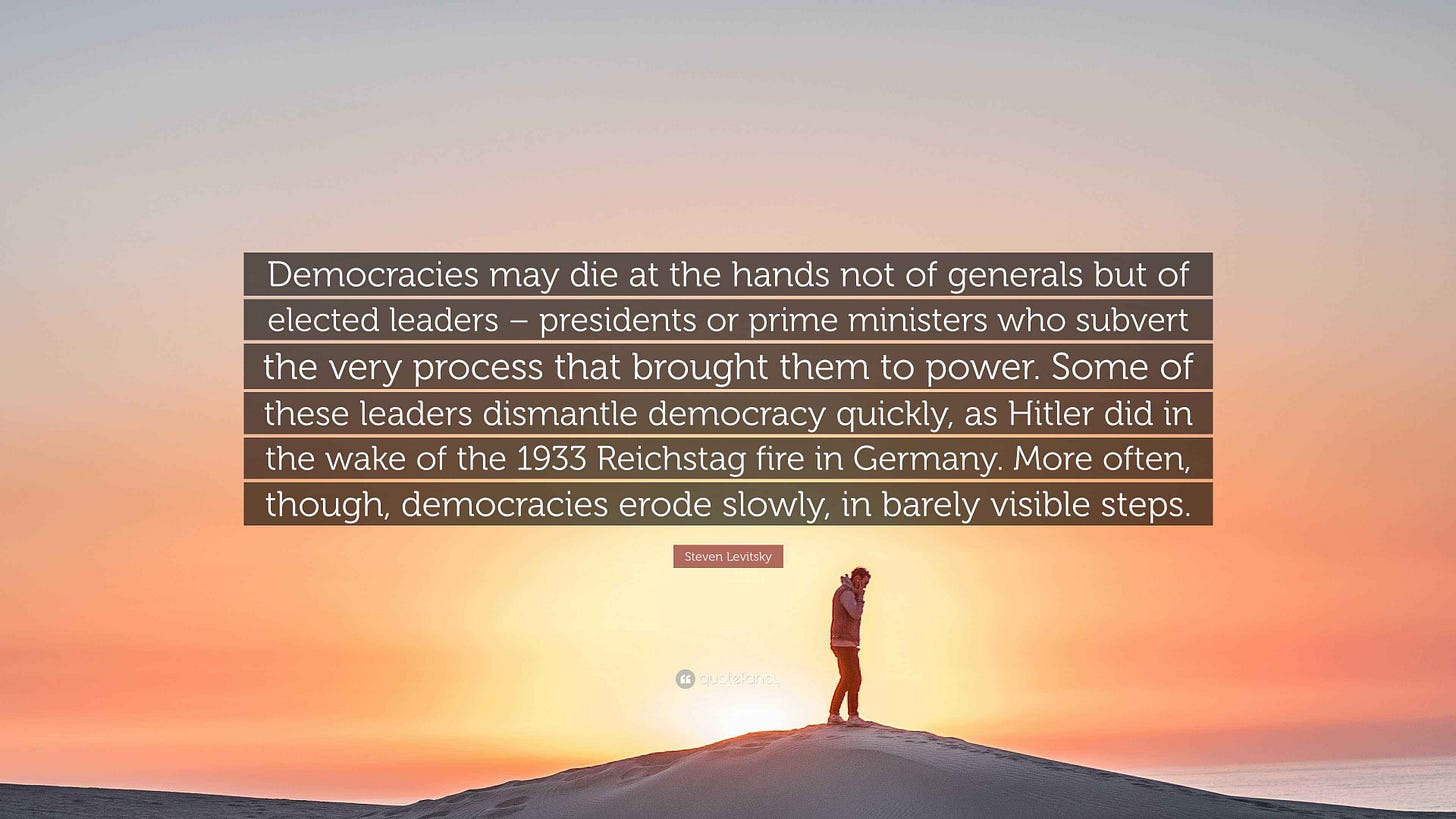How did we get here? What is happening to us? What sense are we to make of the deconstruction of the federal government under Trump 2.0? Is this government conservative or just catastrophic, incautious or just incompetent?
Like many, I’ve gone looking for insights into how and why we now find ourselves as a nation and as citizens in political and governmental chaos, to say nothing of the social and economic mayhem inflicted by the conduct of our national government. I tend not to give credence to journalists or popular commentators, but rather to writers whose intellectual background, discipline, and scholarship are indicative of their knowledge and expertise in a subject area. So it happens that in recent weeks, the conduct of the current U.S. administration has brought to mind an article that is helpful in engendering insights into our situation.
In the June 1957 issue of The American Political Science Review, Harvard University professor Samuel P. Huntington published an essay entitled “Conservatism as an Ideology” in which he challenged traditional perceptions of conservatism and argued for a somewhat different framework within which to understand the role of conservatism across different historical contexts and sociopolitical circumstances. In his view, conservatism is not primarily a fixed set of principles but rather a system of ideas or ideals—an ideology—that emerges in particular situations in response to perceived threats against established institutions. I think this perspective can provide valuable insights into America’s current political situation (crisis?) and how we can contest the de-democratization at work in the current administration’s actions.
Huntington begins his essay by questioning the essence of conservatism, noting that its definition has varied over time and across cultures. For example, he criticizes the notion that conservatism is merely an aristocratic reaction to democratic movements. Rather, he views it as a response that arises when a significant group perceives that traditional institutions, values, or social orders are under threat. In such scenarios, conservatism functions to defend and preserve the existing order against radical change; it is a response to the actors and agencies calling for, initiating, and effecting otherwise unwanted change.
Central to Huntington's thesis is the idea that conservatism is inherently situational. It does not advocate for a specific set of policies or principles universally but tailors its position based on what is under threat in a particular context. For instance, the conservative defense of monarchy in 18th-century Europe differs fundamentally from the conservative defense of democratic institutions in the 20th-century United States. In both cases, the core objective remains the preservation of established structures deemed essential for societal stability, quite apart from the particular form of government.
Huntington also distinguishes conservatism from other ideologies by emphasizing its lack of a utopian vision of an idealized future. While liberalism or socialism might strive for the realization of such an envisioned all-is-changed future, conservatism is primarily concerned with maintaining the status quo and preventing deterioration. This defensive posture means that conservatism is reactionary, emerging prominently during periods of significant social or political upheaval.
With this situational interpretation of conservatism, Huntington offers an alternative framework for understanding the many ways conservatism has been manifest in different eras in a society’s history. By focusing on the context-specific nature of conservatism, he acknowledges that the ideology of conservatism is adaptable to a fairly broad range of sociopolitical circumstances. The situation and the issues or problems may change, but what remains is the concern to conserve—defend and preserve—the existing state of affairs and its structures.
However, Huntington notes that this adaptability is both a strength and a limitation. On the one hand, the situational nature of conservatism allows it to be a stabilizing force, protecting societies from abrupt and potentially destabilizing changes. By valuing tradition and existing institutions, conservatism can provide continuity and a sense of identity. For example, during times of rapid technological or social change, conservative thought can serve as a counterbalance, urging caution and reflection. (Democrats, are you listening?)
On the other hand, this same flexibility can lead to inconsistencies. Since conservatism lacks a fixed set of principles, what is considered “conservative” can vary widely, sometimes aligning with contradictory positions depending on what is perceived as the established order. This malleability can make conservatism susceptible to co-optation by various movements seeking to preserve their own interests under the guise of defending tradition. (Democrats, are you listening?)
It seems to me that, in our current situation with its unpredictability and disruptions, Huntington’s brief could be viewed as a clarion call for a reorientation of America’s Democratic party. Perhaps it is time for the Democrats to embrace a conservative ideology and become defenders of the (liberal) status quo and preservers of our established structures.
The political landscape during President Donald Trump's first term and now again at the onset of his second term has been characterized by significant social, economic and political dislocation and polarization. The intervening Biden administration may, by some measure, be seen as a less contentious and turbulent period, though it was not without its own tumult. Be that as it may, the foundations and structural integrity of the government itself remained integral and operational during those years. Now, the debates over the role of government, national identity, immigration, economic policy, and international relations are not simply intensifying; they are, rather, shrieking as the conduct of the executive branch appears increasingly to embrace Mark Zuckerberg’s philosophy of “move fast and break things.”
Trump's rise to power is marked by a departure from traditional conservatism. The Republican Party has long championed free markets, limited government, separation of powers, the rule of law, individual freedom, and interventionist foreign policies, but Trump's agenda has emphasized protectionism, nationalism, governmental interference, and a skepticism of international alliances. As Huntington might have it, this Trumpian shift of emphasis away from a more conventional conservatism could be seen as a situational response to what is perceived to be threats against a particular vision of American identity, economic stability, and progress. But rather than formulating a response to what is perceived to be a crisis situation, the conduct of the Trump administration appears to be creating a crisis that altogether demands a response.
Though written almost seventy years ago, Huntington’s essay illuminates what might be called the current Trumpian reaction to the perceived threat of liberal democracy and its governmental institutions and sociocultural systems. However, the nature and form of that reaction are profoundly problematic: the actions taken by the second Trump administration, spanning various elements of governance and dimensions of civil society, are inherently destructive, undermining and dismantling traditional democratic institutions and raising concerns about the erosion of democratic norms. Consider these actions:
Undermining the Rule of Law – President Trump has publicly attacked the judiciary, including issuing threats against judges and disregarding judicial rulings. Such actions challenge the foundational principle of judicial independence, potentially destabilizing the balance of power among the branches of government.
Politicization of Independent Agencies – The administration has dismissed key officials from independent agencies (such as the FTC, FDA, CDC, NIH, NLRB, to name a few), replacing them with loyalists. This politicization threatens the impartiality and effectiveness of regulatory bodies designed to operate free from political influence.
Suppression of Independent Media – Significant cuts have been directed at U.S.-funded media organizations like Voice of America (VOA), effectively silencing institutions that promote free press and democracy globally. This move raises alarms about the administration's commitment to freedom of information.
Erosion of Civil Service Protections – The administration has targeted civil servants involved in diversity, equity, and inclusion (DEI) initiatives, leading to mass firings. This purge undermines the integrity and independence of the civil service, which is essential for non-partisan governance.
Attempts to Control Electoral Processes – The administration has undertaken efforts to influence electoral mechanisms, including the removal of officials, restructuring of agencies overseeing elections, and adding a discriminatory requirement of documentary proof of citizenship to register to vote in federal elections. Such actions could compromise the integrity of the electoral process and erode public trust in democratic outcomes.
Retaliation Against Dissent – The administration has exhibited a pattern of retaliating against critics, including members of Congress and civil society organizations. This environment of intimidation threatens free speech and the healthy functioning of a pluralistic society.
International Perception and Civic Freedoms – The United States has been added to the Civicus Monitor Watchlist due to a rapid decline in civic freedoms. This inclusion reflects growing concerns about the country's commitment to upholding democratic principles and protecting civil liberties. These developments have sparked widespread concern among domestic and international observers regarding the resilience of U.S. democratic institutions under the current administration.
Now that the current Trump administration is dismantling America's democratic institutions, what attitude and actions should liberal Democrats undertake to preserve and strengthen those institutions?
Given Huntington's analysis that conservatism emerges as a reactionary ideology aimed at preserving institutions it perceives as threatened, and given the onset of the erosion or dismantling of democratic institutions under another Trump administration, Democrats should adopt a similarly vigilant yet constructive stance to protect and reinforce American democracy. Among other emphases, the Democrats should undertake initiatives that implement and express their attitudes, values, and commitments toward liberal Democracy. Among such action ought to focus on messaging and embodying the following:
Reaffirm Democratic Norms and Values – Liberal Democrats must explicitly reaffirm the fundamental values of democracy—such as transparency, accountability, rule of law, and the sanctity of electoral processes. By actively championing these core democratic ideals, Democrats can offer an ideological and moral anchor against authoritarian or anti-democratic drift.
Build Broad-Based Coalitions – Recognizing the existential stakes, Democrats must reach beyond partisan divides and form broad-based coalitions that include moderate conservatives, independents, and civic organizations. This unity reinforces the perception that the struggle for democracy transcends narrow ideological or party concerns.
Strengthen Civic Education and Public Engagement – A cornerstone action involves reinvigorating civic education to restore public confidence in democratic institutions. Democrats should advocate for robust civic literacy programs and public awareness campaigns emphasizing the importance of democratic participation, informed voting, and civic responsibility. An informed electorate remains the most effective check against authoritarian tendencies.
Defend Independent Institutions – Democrats must vigorously defend the independence and impartiality of critical institutions, including the judiciary, free press, electoral commissions, and law enforcement agencies. Mobilizing legal, political, and civic resources to resist political interference in these institutions helps safeguard democracy from executive overreach.
Promote and Protect Voting Rights – Voting remains the primary means through which democratic legitimacy is derived. Democrats should therefore commit significant resources and effort to counter voter suppression, expand voter registration, and ensure equitable access to voting. Legal challenges against policies undermining voting rights must be proactive and persistent.
Utilize Legal and Constitutional Mechanisms – Democrats should consistently utilize the checks and balances embedded within the American Constitution. Strategic litigation and legal advocacy can serve as potent tools to challenge unconstitutional or authoritarian measures, providing tangible and immediate protection against democratic erosion.
Encourage Civic Resistance and Peaceful Protest – Active yet peaceful civic resistance, including organized protests, demonstrations, and public actions, has historically served as a powerful check against authoritarian tendencies. Democrats should support and responsibly organize such actions as a public demonstration of democratic resilience, drawing attention to specific abuses of power.
Foster Dialogue and Reduce Polarization – Democrats must consciously resist exacerbating existing polarization. By actively fostering dialogue across ideological divides, they can diminish the destructive “us versus them” mentality that Huntington identified as particularly corrosive to institutional trust. Constructive engagement, rather than demonization, should be the guiding principle.
Transparency and Accountability in Governance – Where Democrats maintain political power at state or local levels, they should set clear examples of transparent governance and ethical leadership. Demonstrating a contrast through good governance practices helps to rebuild faith in democratic processes, especially in comparison to federal dysfunction or authoritarian practices.
International and Global Cooperation – Given the global implications of a weakened U.S. democracy, Democrats should actively engage with international democratic allies and institutions to provide external support and legitimacy to domestic democratic efforts. Multilateral cooperation reinforces domestic resilience against authoritarian tendencies and provides diplomatic pressure against anti-democratic actions.
Huntington’s analysis reminds us that the preservation of democracy requires constant vigilance, active engagement, and broad societal cooperation—elements that lovers of freedom, equality, and justice must now prioritize to effectively counteract democratic erosion.
But what are we to do when so many of our fellow citizens are acquiescent in their civic passivity and claim disinterest in policy and political affairs and personages? We can endeavor—thoughtfully, respectfully, yet effectively—to persuade our fellow citizens to pay attention to political issues and actively participate in civic life by taking up strategies like the following:
Frame political topics and issues in ways that resonate with people's personal experiences, everyday lives, and communities by highlighting concrete examples of how political decisions directly affect their well-being, families, workplaces, and neighborhoods. We should approach conversations with curiosity, openness, and active listening rather than confrontation or moralizing. The concerns, fears, and frustrations expressed by our conversation partners, no matter how different from our own beliefs and perspectives, need to be acknowledged, taken seriously and validated as genuine. It is good to tell stories that humanize abstract political issues; narratives about individuals who have positively impacted society through civic engagement or suffered from political neglect or mismanagement can be very influential.
We need to encourage small, manageable steps like actually casting a ballot, or attending local informational gatherings, or joining a community group. It can be a short step from here to encouraging a person to contact their representatives, or volunteer for a civic initiative, or write a letter to the newspaper editor. It is essential that the pathways to engagement be made clear, rather than offering some vague encouragement to “get involved.” Engaging with existing community groups, social networks, religious institutions, or cultural organizations that are already trusted are gateways to more substantive civic activity; such interactions tend to expose individuals to leaders within these networks who advocate more persuasively and authentically on issues of political import. Moreover, participating in local town halls and community forums (to say nothing of volunteer initiatives) are opportunities for direct experience of engaging with decision-makers and civic leaders.
In addition to emphasizing and promoting stories of successful civic action, positive collaboration, and civic participation, we democracy defenders must take seriously our role in providing accessible, factual, and balanced resources explaining complex political issues clearly and succinctly. As defenders of democracy, we ought to be on the alert for, or ourselves the organizers of, educational workshops, webinars, community sessions, (Zoom meetings, for crying out loud) that encourage open discussion and critical thinking. We would do well not to share in the cynicism and despair of many, and instead highlight the cases where engaged citizens have genuinely influenced outcomes.
When Huntington died in 2008, an encomium appeared in Prospect, a British current affairs journal, that lauded him as “instinctively a conservative because he valued an ordered society, but he also championed conservatism as a necessary instrument to defend liberal institutions...” Yes, he was an unusual scholar with social and political sentiments that were customary in his lifetime but all to rare or nonexistent in our own; he was a conservative Democrat! And while we may struggle to adopt strategies that seek to renew a sense of collective responsibility in public life and connect with fellow conservatives, be they unaffiliated, libertarian, or Republican, we ought also be reminded of this lesson from this “intellectual rarity”: Fight fire with fire, or as he would probably say it now, use democracy to preserve, protect, defend and enhance our democracy!

